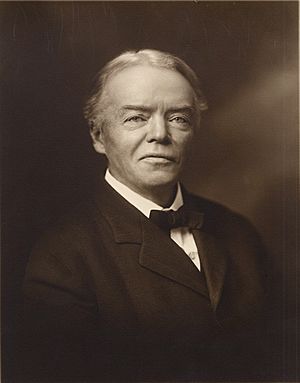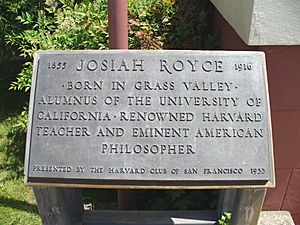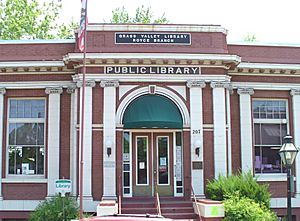Josiah Royce facts for kids
Quick facts for kids
Josiah Royce
|
|
|---|---|
 |
|
| Born | November 20, 1855 Grass Valley, California, U.S.
|
| Died | September 14, 1916 (aged 60) |
| Education | University of California, Berkeley (B.A., 1875) Johns Hopkins University (Ph.D., 1878) |
| Era | 19th-century philosophy |
| Region | Western philosophy |
| School | Objective idealism American idealism |
| Thesis | Interdependence of the Principles of Human Knowledge (1878) |
| Academic advisors | Hermann Lotze Charles Sanders Peirce |
| Doctoral students | Curt John Ducasse C. I. Lewis George Santayana |
| Other notable students | Edwin Holt |
|
Main interests
|
Ethics, philosophy of religion |
|
Notable ideas
|
Practical life as the guide and determiner of the value of philosophical ideas |
|
Influences
|
|
|
Influenced
|
|
| Signature | |
Josiah Royce (November 20, 1855 – September 14, 1916) was an important American philosopher. He is known for his ideas about "objective idealism" and for starting "American idealism."
Royce believed that our ideas and the world around us are connected. He also thought that our actions and choices in real life help us understand what philosophical ideas are truly valuable. He developed a special philosophy about loyalty and defended the idea of an "Absolute" truth.
In 1936, a quote from Royce's writing, "A Word for the Times" (1914), was used by President Franklin D. Roosevelt in a speech. It talked about how humanity faces big challenges and needs courage, patience, and loyalty.
Royce was also unique because he was a major American philosopher who studied and wrote history. His historical work mainly focused on the American West.
Contents
Life of Josiah Royce
Josiah Royce was born on November 20, 1855, in Grass Valley, California. His parents, Josiah and Sarah Eleanor Royce, were English immigrants. They came to America during the California Gold Rush in 1849.
In 1875, Royce earned his bachelor's degree from the University of California, Berkeley. He later became a teacher there, focusing on English writing and literature.
While at the university, he learned from Joseph LeConte, a geology professor. LeConte's ideas about how evolution and religion could fit together greatly influenced Royce. Royce later said that LeConte's teaching was "the beginning of philosophy" for him.
After studying in Germany, Royce finished his doctorate in philosophy in 1878 at Johns Hopkins University. He was one of the first four people to earn a Ph.D. from that university.
In 1882, he moved to Harvard University to fill in for his friend, William James. Royce's teaching position at Harvard became permanent in 1884. He taught there until his death on September 14, 1916.
Royce as a Historian
Josiah Royce stands out because he was the only major American philosopher who spent a lot of time studying and writing history. He focused on the history of the American West. Even though he was a famous philosopher, his work as a historian was also very important.
During his first few years at Harvard, Royce taught many different subjects. These included English writing, public speaking, psychology, and philosophy. He also wrote a novel and looked into strange events as a skeptic. He became well-known for his work in history and philosophy.
In 1883, a publishing company asked Royce to write a history of California. He saw this as a good opportunity to earn money and work on a side project. He published several reviews and articles about California's history. By 1891, his career as a historian came to an end.
Royce's Philosophy
Between 1882 and 1895, Royce became one of America's most important philosophers. He published two major books based on his Harvard lectures: The Religious Aspect of Philosophy (1885) and The Spirit of Modern Philosophy (1892).
In The Religious Aspect of Philosophy, Royce presented a new way to think about God. He argued that even our mistakes show that there is a larger truth. He believed that our ideas need to connect to a universal truth. Without this connection, he thought, "both practical life and the commonest results of theory... would be for most if not all of us utterly impossible."
Royce also believed that philosophical ideas should be useful in everyday life. He even called himself a "pragmatist" because he thought practical life should guide what we value in philosophy. He admitted that he couldn't fully explain how individual minds connect to a larger, all-knowing mind. However, he kept trying to offer the best explanation he could.
The Idea of the "Absolute"
Royce's idea of the "Absolute" was different from other philosophers. He saw the Absolute as the source of community. He thought of it as a personal being that exists in time. This Absolute remembers the past, understands the present, and looks forward to the future. It gives value to all possibilities.
Royce believed that we experience the Absolute when we realize that our actions cannot be undone. This shows us the necessary nature of time. For Royce, a "will to interpret" is all humans need for a meaningful life. This "Interpreter Spirit" is another name for the Absolute.
The Philosophy of Loyalty
Royce's ideas about loyalty are very important. He wrote a book called The Philosophy of Loyalty in 1908. In this book, he presented one of the most original moral philosophies of his time.
He saw loyalty as a deep devotion to a cause that is bigger than oneself. As people become more loyal to ideals, it helps them grow morally. Royce believed that as these loyalties come together, humanity can create a perfect "beloved community." In this community, everyone shares in a common good.
Royce argued that our ideals are very practical. The more inclusive an ideal is, the more practical it becomes. He believed that when we serve a larger cause, we experience a sense of fulfillment. This feeling points to a reality beyond our personal experience. For example, when people fall in love, they experience a "spiritual union" that is a higher level of consciousness.
Royce believed that if loyalty is real, then this higher level of consciousness must exist. This means that the good we find in our causes is a real fact for a higher experience. He said that our personal character grows when we realize that our ultimate loyalty should be to loyalty itself.
Logic and Psychology
Royce also influenced the study of logic and mathematics at Harvard. He was inspired by philosophers like Charles Sanders Peirce. His students, like Clarence Irving Lewis, went on to make important contributions to logic.
In psychology, Royce's ideas about how the individual self and society interact were very important. He believed that our "self" comes from our social experiences. He wrote that "the Ego is always known in contrast to the Alter" (meaning, our self is known by comparing it to others).
Royce also thought that our social self could become unhealthy. He saw delusions of grandeur (thinking you are much more important than you are) or persecution (thinking people are out to get you) as twisted versions of normal self-awareness.
Legacy of Josiah Royce
Josiah Royce's influence can be seen in several places named in his honor:
- The Royce School, which later became the Head-Royce School.
- Royce Hall, one of the original buildings at UCLA.
- The Grass Valley Public Library, renamed in his honor in 1933.
- Josiah Royce Hall at Fresno High School.
- Royce House, a dormitory at Johns Hopkins University in Baltimore, Maryland.
- Royce Peak, a mountain summit in California.

Selected Publications
- 1885. The Religious Aspect of Philosophy
- 1886 California : A Study of American Character : From the Conquest in 1846 to the Second Vigilance Committee in San Francisco
- 1892. The Spirit of Modern Philosophy
- 1897. The Conception of God, a philosophical discussion concerning the Nature of the Divine Idea as a Demonstrable Reality
- 1898. Studies of Good and Evil: a series of Essays upon Problems of Philosophy and of Life
- 1899. The World and the Individual First Series, The Four Historical Conceptions of Being
- 1900. The Conception of Immortality
- 1901. The World and the Individual Second Series, Nature, Man, and the Moral Order
- 1903. Outlines of Psychology: an elementary treatise, with some practical applications
- 1904. Herbert Spencer: An Estimate and a Review
- 1908. The Philosophy of Loyalty
- 1909. What is Vital in Christianity?
- 1912. The Sources of Religious Insight
- 1912. William James, and Other Essays on the Philosophy of Life
- 1913. The Problem of Christianity
- 1914. War and Insurance
- 1916. The Hope of the Great Community
- 1919. Lectures on Modern Idealism
- 1920. Fugitive Essays
Images for kids
See also
 In Spanish: Josiah Royce para niños
In Spanish: Josiah Royce para niños
 | Mary Eliza Mahoney |
 | Susie King Taylor |
 | Ida Gray |
 | Eliza Ann Grier |



